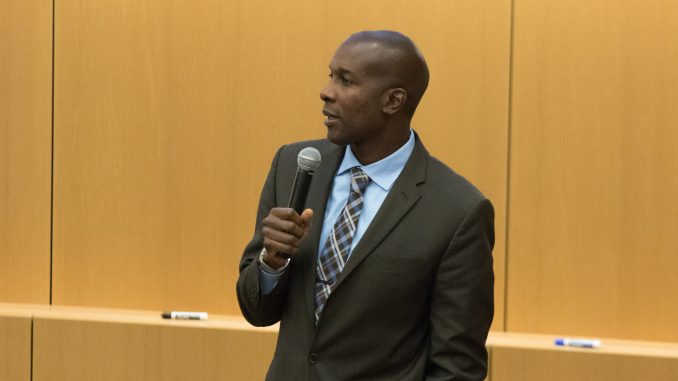
The Office of Health Equity, Diversity and Inclusion hosted their second annual Evening for Black Men in Medicine at the Lewis Katz School of Medicine on Friday.
The event gave young Black aspiring medical professionals the opportunity to hear from Black industry professionals and network with other students and professionals.
The night started off with an address from the keynote speaker Dr. Damon Tweedy, who recently released his New York Times Bestseller “Black Man in a White Coat.”
“You all should congratulate yourselves for being here,” he said.
Tweedy congratulated attendees for their hard work and recalled how certain societal stigmas and labels have pulled Black men away from the field of medicine.
“Where I went to school growing up the message was kind of like, if you were a Black man and wanted to succeed in this world and you didn’t play ball, I wasn’t sure what you were going to do,” he said.
His message comes at a time where the amount of Black men pursuing careers as doctors has stagnated even though the amount of people in the field has increased. 1,410 black male students applied to medical school in 1978, while in 2015, 1,337 applied, the Association of American Medical Colleges reported in 2015.
Last year, the Lewis Katz School of Medicine only had one Black male student enrolled in the incoming class. This year, the number has increased to 15 but challenges remain in recruiting students from underrepresented backgrounds.
Melanie Cosby, director at the Office of Health Equity, Diversity and Inclusion, said she has seen a lack of Black men in medicine.
“If we had more representation in medicine and a greater sensitivity to the role that culture, racism, and oppression plays in health and health care, we think Black men would help alleviate those concerns,” Cosby said.
The office aims to recruit and retain more people into the field of medicine who come from underrepresented communities. They’ve worked to create more pipeline programs to attract more local high school students. The office hosted the Health Careers Exploration Day in which Black medical students exposed North Philadelphia-area high school students to their professions and the possibilities in the medical field.
As the night progressed, current and aspiring medical students were given a copy of “Black Man in a White Coat” and had the opportunity to have it signed by Tweedy. There was also a dinner where they could network with other students and industry professionals.
Sean Brown, a second year medical student, was the only Black male medical student in last year’s incoming class. He said he was glad to see accomplished individuals in the medical field who look like him.
“Seeing role models who look like you is super important. Today a lot of media representation of us is seeing someone who shoots a basketball or catches a football,” he said. “Giving back and increasing representation is definitely important going forward.”
Shortly after dinner, Vincent Cowell, a clinician educator, was presented with the Black Men in Medicine Award for his long-standing contributions to aspiring Black medical students. He urged students to continue their hard work and find ways to pave the way for those coming after them.
“Use this opportunity to remember whose shoulders you stand,” he said. “But more importantly, it is your responsibility to mentor and set the path for those coming behind you.”


Be the first to comment